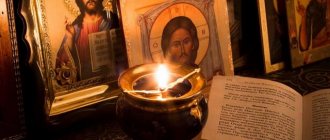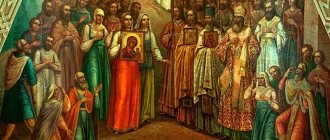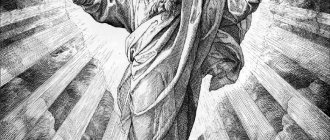Summary
Prince Vladimir Svyatoslavovich “had 12 sons, and not from one wife: they had different mothers.” Boris and Gleb were his sons from his Bulgarian wife. When they grew up, Prince Vladimir sent them to reign: Boris to Rostov, and Gleb to Murom.
When Vladimir was on his deathbed, hordes of Pechenegs moved to Rus'. Having learned about this, Vladimir sent Boris to fight the enemy. However, the young prince never met anyone.
In the meantime, Vladimir Svyatoslavovich died. One of his eldest sons, Svyatopolk, decided to hide this news, kill all the heirs and take the throne. Boris received news of his father's death and his brother's insidious plans. However, despite the entreaties of the squad, he was not going to drive Svyatopolk out of his illegal reign. Boris believed that “salvation is only in good deeds, in true faith and in unfeigned love.” He was going to bow to Svyatopolk and recognize him as the Grand Duke. However, his pious plans were not destined to come true. Soon, assassins sent by the treacherous Svyatopolk appeared and killed Boris and his faithful servants. The remains of the young prince were buried near the Church of St. Basil in Vyshgorod.
“The accursed Svyatopolk did not stop at this murder,” and began to hatch a plan to kill Gleb. He wrote him a letter in which he urged him to come to the bedside of his seriously ill father. While on his way to Kyiv, he was warned about the death of Prince Vladimir Svyatoslavovich and the murder of his brother Boris. This news was a big blow for Gleb. When he was mourning his loved ones, “his evil servants sent by Svyatopolk suddenly appeared, ruthless bloodsuckers, fierce brother-haters, ferocious beasts.” The young prince begged not to destroy him, but Svyatopolk’s servants were inexorable. Then he began to frantically pray to the Lord, and soon ascended to heaven, where he met his beloved brother. The killers returned to their master and reported on the completed task. At the place where Gleb’s body lay, the travelers saw a high pillar of fire and heard beautiful angelic singing.
Having learned about the death of Gleb and Boris, their brother Yaroslav moved with his squad against Svyatopolk. He prayed to God, asking him to bring justice and avenge the death of his innocent brothers. With God's help, Yaroslav defeated Svyatopolk's army, and he fled in fear. He died in a vacant lot near Poland, and a terrible stench emanated from his grave.
From that time on, “the strife in the Russian land stopped, and Yaroslav took over the entire Russian land.” Having become a prince, he found the incorrupt body of Gleb and buried him next to the body of Boris. Many miracles still emanate from the relics of the holy passion-bearers: “the blind receive their sight, the lame run faster than a chamois, the hunchbacked are straightened.”
Death of Vladimir. Svyatopolk seizes the throne
When the days of Vladimir were already coming to an end, the Pechenegs attacked Rus'. The prince sent Boris against them. He went on a campaign, but did not meet the enemy. When Boris was already returning back, the messenger told him that his father had died. He also said that Svyatopolk wanted to hide his death. Boris, listening to this story, began to cry. He realized that Svyatopolk’s goal was to seize power into his own hands and kill him. However, Boris decided not to resist. Svyatopolk really treacherously took over the throne. Boris, despite the persuasion of his squad, did not try to drive him out of his reign.
Murder of Boris
Svyatopolk, meanwhile, bribed the people of Kiev. He wrote a tender letter to Boris. However, his words were false. In reality, he longed for the death of all Vladimir's heirs. Svyatopolk began by giving the order to kill Boris to his squad. It consisted of Vyshgorod men, and was headed by Putynya.
Boris spread his camp on the river. Alte. He prayed in the evening in his tent, thinking that he would soon die. Waking up, Boris ordered the priest to serve matins. The killers sent by Svyatopolk approached his tent and heard the words of prayers. Hearing a whisper, Boris realized that the killers had arrived. Seeing his sadness, the priest and servant grieved for him.
But then Boris saw the killers walking with weapons in their hands. They pierced the prince with spears. Boris's servant tried to stop them. He covered the master with his body. This servant's name was George, he was Hungarian. The killers pierced him with a spear. George, wounded by them, jumped out of the tent. The prince was still alive, and the villains wanted to inflict new blows on him. However, Boris began to ask to be allowed to pray to God. After reading the prayers, he turned to the killers, asking for their forgiveness, and then told them to finish their job. This is how Boris died. This happened on July 24th. Many of his servants were also killed, including George. In order to remove the hryvnia from his neck, his head was cut off.
The prince was wrapped in a tent and then taken away on a cart. Boris raised his head as they drove through the forest. Two Varangians again pierced him with a sword in the heart. The prince's body was laid in Vyshgorod. He was buried at the Church of St. Basil.
Murder of Gleb
Gleb was sailing along the river at that time. Smyadyn on his boat. The killers were in another boat. They began to row towards him. Gleb thought that their intention was to greet him. However, the villains began to jump into the prince's boat with drawn swords. Gleb began to beg them to save his life. However, Svyatopolk's servants turned out to be inexorable. Gleb began to pray to God for his brothers, his father, and even for Svyatopolk, his murderer. After this, Torchin, his cook, stabbed his master. Gleb ascended to heaven, where he met his beloved brother. This happened on September 5th.
The murderers returned to Svyatopolk. They told him that they had fulfilled the command. The evil prince rejoiced...
Canonization and veneration
The holy princes were canonized by the Russian and Constantinople churches. Boris and Gleb are glorified as passion-bearers. This means that they accepted martyrdom, fulfilling the commandment of God. Most often, passion-bearers suffer at the hands of their fellow believers. The peculiarity of the feat of the passion-bearers lies in the absence of resistance to the murderers, as well as anger towards their tormentors.
Day of Remembrance
The saints are commemorated several times a year:
- May 15 – transfer of relics (1115);
- August 6 – Feast of St. Boris and Gleb;
- September 18 – murder of Prince Gleb;
- June 5 – Cathedral of Rostov-Yaroslavl Saints;
- June 23 – Cathedral of Ryazan Saints;
- October 5 – Cathedral of Tula Saints;
- July 6 – Cathedral of Vladimir Saints;
- Cathedral of Smolensk Saints (movable date).
Saints are commemorated several times a year
Icons
The image of the holy brothers on icons began to appear immediately after their canonization. In the works of Nestor the Chronicler it is noted that the creation of images began at the behest of Prince Yaroslav the Wise. According to researchers, the iconography was formed no earlier than the 1070s. Not a single image of the brothers created before this period has survived. But reliquary crosses with images of passion-bearers are known, which date back to the 11th century. and the beginning of the XII century.
According to tradition, the brothers on the icon are placed together at full height. They are dressed in clothes required by princely status. In their hands are crosses symbolizing martyrdom, sometimes along with swords. The sword is a symbol of a warrior and a prince. There are also images of brothers half-turned to each other. Already in the post-Mongol years they began to be painted on horses.
Temples
The first temple was erected in Vyshgorod near the church in which their relics rested. Now many Boris and Gleb churches and monasteries have been opened on the territory of modern Russia, Ukraine and Belarus. There is also a Church of the Passion-Bearers in Spain on the Canary Islands.
Due to the destruction of the temple in Vyshgorod during the Mongol raid in 1240, the holy relics were lost. They were never found.
Church in the village Kideksha, Suzdal district, Vladimir region
Boris and Gleb Monastery in Torzhok
Church in Veliky Novgorod
Monuments
In 2006, in the city of Dmitrov, a monument to the saints was erected near the monastery in honor of the passion-bearers. This work by master Alexander Rukavishnikov is an amazing composition. The brothers are represented on the same pedestal on horseback.
Princes Boris and Gleb deeply felt and understood Orthodoxy. They sacrificed themselves to save Rus' from decline and save the lives of many soldiers. This act is the fulfillment of the Gospel commandment not to resist evil.
If you find an error, please select a piece of text and press Ctrl+Enter.
Fairy tale and reality
The author told us a beautiful, touching, sad story. He told us about good and evil, about strength and weakness, about youth and love (for the fatherland, brotherly, filial). It is known that Boris and Gleb are not fictional characters, but real people. Their murder took place in the history of Rus'. However, the legend about these people seems like a beautiful and kind fairy tale that grandmother tells in the evenings. With bated breath we follow what is happening. We feel sorry for the young men. However, evil, as usual, must be punished. Yaroslav took revenge for Svyatopolk's brothers. Boris and Gleb are buried in the same grave, which is one of the symbols of Rus'. The legend of Boris and Gleb was passed down from generation to generation. Analysis of the work dedicated to these brothers is of great interest today. After all, this is a creation of great artistic power. Briefly characterizing “The Tale of Boris and Gleb,” we can say that it affirms the ideas of Christianity and patriotism.
The author's attitude towards Boris and Gleb
The creator of the work bows before these brothers. He tries to tell the reader as much as possible about their ideal behavior and spiritual beauty. Reading the work, you are filled with admiration for the brothers to whom “The Tale of Boris and Gleb” is dedicated. The theme of the work, of course, is broader than the description of their deeds and heroic death, but they occupy a central place in it. Today you rarely meet a kind, good person without a second thought. Boris and Gleb are just such people. These are examples of purity and innocence. You will see this if you read “The Tale of Boris and Gleb.” Reviews of the work speak of the deep impression that its main characters make on readers.
Yaroslav's warning
However, this did not end the dramatic events of the work “The Tale of Boris and Gleb”. The author further writes that after some time Svyatopolk decided to carry out a new atrocity. The prince sent a letter to Gleb, in which he reported that Vladimir, his father, was seriously ill and asked him to come. Gleb believed and went to Kyiv. Near the Volga he injured his leg and stopped not far from Smolensk, on the river. Smyadyn. Meanwhile, the news of Vladimir's death reached Yaroslav, one of the 12 sons of Prince Vladimir Svyatoslavich. Yaroslav reigned in Novgorod at that time. He sent a warning to Gleb not to go to Kyiv, since his father had died and Boris had been killed. When the prince cried for them, Svyatopolk’s servants suddenly appeared in front of him, who were sent to kill him.
Analysis of the work
An excellent example of the hagiographic genre is “The Tale of Boris and Gleb.” The analysis of the work should begin with the fact that it is certainly valuable for Russian literature, history and culture in general. This is a real find for people who are interested in hagiographic literature. This work is written in an original, imaginative, vivid way. The author who created “The Tale of Boris and Gleb” put his whole soul into his creation. Its analysis must necessarily include a story about the images of Boris and Gleb, which are central to the work.
Battle on Alta, flight of Svyatopolk
Meanwhile, Yaroslav and his army marched against Svyatopolk in order to take revenge on him for his brothers. Victories accompanied Yaroslav. Arriving at the river Alto, he stood at the place where Boris was killed and prayed to God for victory over the villain.
The battle on Alta lasted all day. Yaroslav defeated the enemy by evening, and Svyatopolk (his portrait is presented above) fled. Madness overwhelmed him. He became so weak that he had to be carried on a stretcher. Even after the chase stopped, the prince ordered to escape. He was carried on a stretcher across the entire Polish land. Svyatopolk died in a deserted place between Poland and the Czech Republic. His grave has been preserved. A terrible stench emanates from her.






